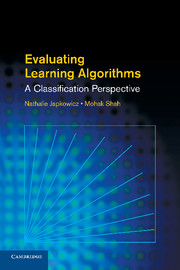Book contents
- Frontmatter
- Contents
- Preface
- Acronyms
- 1 Introduction
- 2 Machine Learning and Statistics Overview
- 3 Performance Measures I
- 4 Performance Measures II
- 5 Error Estimation
- 6 Statistical Significance Testing
- 7 Datasets and Experimental Framework
- 8 Recent Developments
- 9 Conclusion
- Appendix A Statistical Tables
- Appendix B Additional Information on the Data
- Appendix C Two Case Studies
- Bibliography
- Index
1 - Introduction
Published online by Cambridge University Press: 05 August 2011
- Frontmatter
- Contents
- Preface
- Acronyms
- 1 Introduction
- 2 Machine Learning and Statistics Overview
- 3 Performance Measures I
- 4 Performance Measures II
- 5 Error Estimation
- 6 Statistical Significance Testing
- 7 Datasets and Experimental Framework
- 8 Recent Developments
- 9 Conclusion
- Appendix A Statistical Tables
- Appendix B Additional Information on the Data
- Appendix C Two Case Studies
- Bibliography
- Index
Summary
Technological advances in recent decades have made it possible to automate many tasks that previously required significant amounts of manual time, performing regular or repetitive activities. Certainly, computing machines have proven to be a great asset in improving human speed and efficiency as well as in reducing errors in these essentially mechanical tasks. More impressive, however, is the fact that the emergence of computing technologies has also enabled the automation of tasks that require significant understanding of intrinsically human domains that can in no way be qualified as merely mechanical. Although we humans have maintained an edge in performing some of these tasks, e.g., recognizing pictures or delineating boundaries in a given picture, we have been less successful at others, e.g., fraud or computer network attack detection, owing to the sheer volume of data involved and to the presence of nonlinear patterns to be discerned and analyzed simultaneously within these data. Machine learning and datamining, on the other hand, have heralded significant advances, both theoretical and applied, in this direction, thus getting us one step closer to realizing such goals.
Machine learning is embodied by different learning approaches, which are themselves implemented within various frameworks. Examples of some of the most prominent of these learning paradigms include supervised learning, in which the data labels are available and generally discrete; unsupervised learning, in which the data labels are unavailable; semisupervised learning, in which some, generally discrete, data labels are available, but not all; regression, in which the data labels are continuous; and reinforcement learning, in which learning is based on an agent policy optimization in a reward setting.
- Type
- Chapter
- Information
- Evaluating Learning AlgorithmsA Classification Perspective, pp. 1 - 22Publisher: Cambridge University PressPrint publication year: 2011



